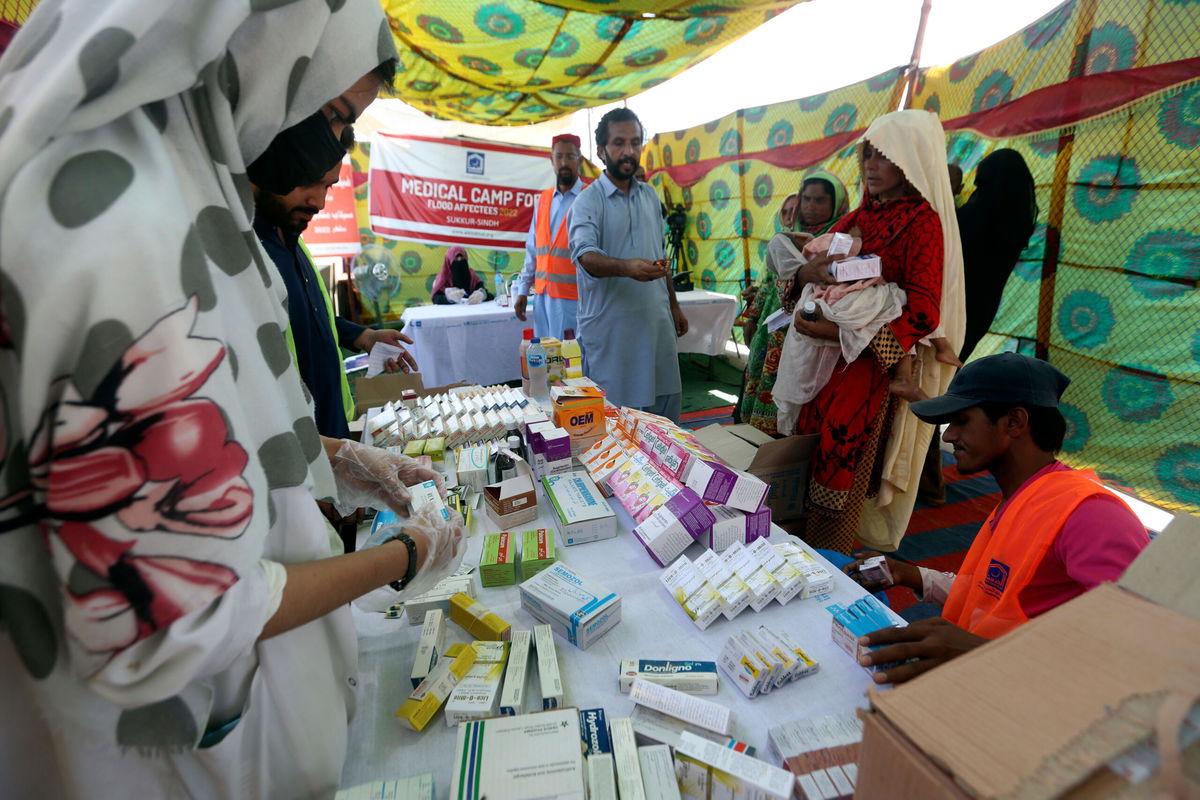Water from Pakistan’s largest lake threatens to spill into densely populated cities

Displaced families wait to receive medicine at a distribution point in Sukkur
By Hannah Ritchie, Kathleen Magramo and Jan Camenzind Broomby, CNN
Water levels at Pakistan’s largest freshwater lake remain dangerously high despite efforts to release water and spare nearby cities further flooding, according to officials.
It’s the latest challenge facing officials as the country grapples with an escalating disaster as heavy monsoon rains combine with melting glaciers to cover one third of the country in water.
The number of deaths since mid-June reached 1,325 as of Monday, with more than 12,000 injured, according to the Pakistan’s National Flood Response Coordination Centre (NFRCC). And the death toll is expected to rise.
At least 33 million people have been affected by the flooding — around 15% of the country’s population — according to government officials and aid organizations.
Some areas — particularly the southern provinces of Sindh and Balochistan — have seen five times their normal levels of monsoonal rain.
On Sunday, officials attempted to release water from Lake Manchar, in Sindh province, into nearby districts of Jaffarabad and Bubak, home to around 100,000 people, according to Jamal Mangan, Pakistan’s Irrigation Special Secretary.
They had hoped to prevent the lake from overflowing and flooding more populated cities and towns across Sindh, including Sehwan, Dadu and Bhan Syedabad, Mangan said.
But Jam Khan Shoro, the provincial minister for irrigation, said on Monday that despite their efforts, water levels in the lake remained stubbornly high.
“The water level at Manchar lake has not come down,” Shoro told Reuters, declining to say if another attempt to drain water from the lake would be made.
‘This will not be over in two months’
Several international aid agencies were beginning to arrive in flood-ravaged Pakistan on Monday, delivering much needed food, clean water and medicines to victims of what the United Nations has called a “monsoon on steroids.”
Three million children are now in need of urgent humanitarian assistance across Pakistan due to the increased risk of waterborne diseases, drowning and malnutrition, UNICEF warned in a statement Wednesday.
Dr. Deedar Hussain from Pakistan’s health department said he feared of an outbreak of waterborne diseases if the flood waters do not recede fast enough.
“Many patients have come to us. According to our register, we have received 16,000 patients (from over the district). Mostly patients are suffering from allergy because of (flood) water, and there are patients suffering from diarrhea and fever. Also there are patients suffering from malaria as we are conducting malaria parasite tests on them,” Hussain told Reuters on Saturday.
Aurélie Godet, a press officer with Médecins du Monde, told CNN on Thursday the flood waters had washed away everything.
“Survivors must start from scratch. They need urgently dignified shelters, affordable food, access to health and to basic commodities. But this will not be over in two months, they need a long-term aid,” Godet said.
Godet said that children have been coming to their clinics with severe injuries on their feet because they have no shoes. And she said some people can’t afford their regular medicine because of price increases that are also making food too expensive, even outside the flood zone.
“In the dryer areas, survivors are telling us that one difference now for them is the prices of the food, because the roads are inaccessible. It is four times the prices of the market. They cannot afford to eat,” she said.
Pakistan’s Prime Minister Shehbaz Sharif said on August 30 the floods were “the worst in the country’s history” and estimated the calamity had caused more than $10 billion in damages to infrastructure, homes and farms.
According to charity Action Against Hunger, 27 million people in the country did not have access to enough food prior the floods, and now the risk of widespread hunger is even more imminent.
The-CNN-Wire
™ & © 2022 Cable News Network, Inc., a Warner Bros. Discovery Company. All rights reserved.
Additional reporting from CNN’s Azaz Syed and Reuters.